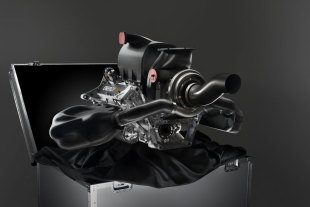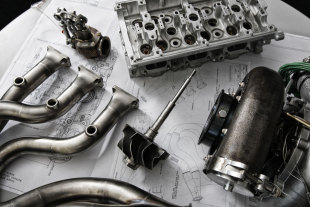- GP Week
'There's a lot more going on under the bodywork'
The head of Renault Sport F1 Track Operations, Remi Taffin, spoke with GP Week about the outgoing 2.4-litre V8s and the all new 1.6-litre V6 turbos for next year

We're reaching the end of the V8 era for F1. Is there anything Renault has learned that has directly translated into its road car division?
We've worked a lot on the friction of the F1 V8 because it was running at very high revs. The benefit of that technology went onto road cars. The other point is that Renault has done a lot of work on the electrical parts of cars. When we first introduced the KERS system in 2009 we had a good opportunity to liaise with the Renault Group in regards to the electric motors. The motor in Twizy [Renault's ultra-compact road vehicle] was developed on the dyno at RenaultSport F1 which was a good technology transfer.
In that respect is it then a little disappointing having the electric-motor in pit-lane concept scrapped for next year?
There was some discussion that the car would be too silent, but to be fair, for us it's not a really big challenge, it doesn't change the way we design things.
Charlie Whiting alluded in Melbourne that most of the manufacturers have been in close collaboration with the FIA. What kind of anomalies have come up that perhaps weren't foreseen when the rules were first put to paper?
It's always the same story, even this year. This year we also have regulations in place and we try to sort them out in the most optimised way. We have a good dialogue with Charlie and the FIA. There are always some little differences that are raised by our guys by running the engine on the dyno to change things so they're a little bit more reliable. We then ask the FIA: "we want to do this and do you agree it's okay?" But sometimes you can't really afford to do this because there's a set of regulations in place. It's a bit frustrating at times but that's the way it is.
Engine management has been the focus for a few years now. Will that ethos ensure a smooth change into 2014 performance management? How has component life on the new 2014 engines been trialled without any on-track testing?
If you think about the power unit itself it's not really a big deal for us not to be running on track. Firstly, because we've got all the means back at our headquarters in France to test every single component, we're already running some electrical motors in the car so we know the technology. We then have the dyno to test settings. The biggest question is how we will integrate this power unit into the car, because there's a lot more energy to get out of the car; coolers for new energy recovery system which is going to be even bigger, plus the air-cooled system for the turbo-chargers. There's a lot more things going on behind the scenes and under the bodywork. Energy management is the thing we're looking forward to when we go testing.
In terms of your customers, have any of them spoken with you about any abnormal packaging suggestions - as where they might like to position the 2014 power-train? Or do you think they'll be standard across the grid?
I would say no because from the first point we've been sitting around the table with teams to understand how we're going to get the new power unit into the car and what would be the best installation.

Have you learned anything different from a smaller budget team like Caterham than customers like Red Bull? Engine maps?
Being at the top I think Red Bull and Lotus F1 Team often do things quite differently to Caterham or perhaps even Williams. But interestingly they (Caterham or Williams) could run the engine a bit differently and by doing this you discover some new areas that we can work on. At Caterham they might work on one (specific) area where a bigger team might not concentrate so far on in regards to efficiency. So yes it's fair to say we sometimes find new things with smaller teams because they work with the means they've got.
And does that sometimes get transferred across to other customers?
We have a policy in that everything we learn from the team for the team stays with the team. However if we learn something from one team for the engine then it's something we can transfer to the other [Renault customer] teams, should they decide to follow this development path. If you look at the blown exhaust in 2011 we developed a lot of engine maps that Lotus F1 Team at the time. When Red Bull looked into the concept we already had the understanding of what we could do, but we waited until the team wanted to go this way.

